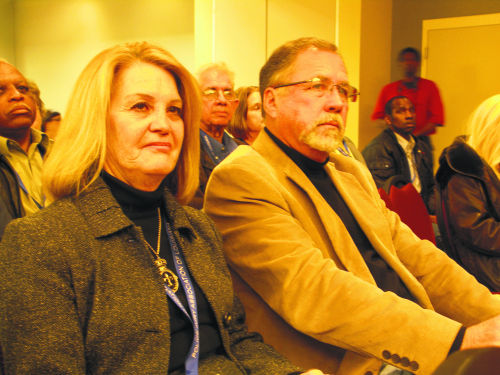
Lafourche Parish President awaits ruling on BP ethics charge
March 12, 2013Our View: We should expect more from officials
March 12, 2013In a room filled with health care workers and their bosses, a key official from the publicly-traded company that now manages mental health care in Louisiana sought input and ideas, at the cusp of the firm’s second year of operation.
Dr. Craug Coenson, CEO of Magellan in Louisiana, the bayou country offshoot of Magellan Health Services, got more than he bargained for.
Brenda Johnson, who for 16 years has held the hands of troubled kids and hapless parents in her job at Terrebonne Parish Juvenile Court, spilled the frustrations born of as many years of setbacks and losses. The most dramatic portion of her statement was a claim to Coenson, who had just completed a slide-show demonstration of what his company has done in Louisiana, was when she said she is tired of children dying.
She also said she is tired of waiting for the kinds of innovation Magellan promises, but has not yet delivered to Terrebonne Parish. In response to statements by Johnson and her boss, City Court Administrator Doug Holloway, Coenson, himself a psychiatrist, offered sympathy and an assurance that being heard was what the forum at the Houma-Terrebonne Civic Center was about.
“This is a national epidemic,” Coenson said of difficulties accessing mental health care for children and others in need. “What is the strategy we are going to have?” Researching who in the private sector can provide services is an important first step, said Coenson. “We want to do more outreach to providers, to psychiatric providers to take more on, expanding use of nurse practitioners … We need to get more psychiatric in there and look at what are the challenges. It is easier said than done.”
On tables graced by giveaway tubes of lip balm swag bearing the Magellan name were brochures touting what the company calls a “Coordinated System of Care.” Johnson and others who help kids in Terrebonne have heard the phrase before, as part of a program they no longer have money to take part in.
The Magellan CSOC is new, however. So new that it hasn’t been used in Terrebonne yet. But it bears promise, and Coenson, along with the CSOC coordinator, discussed its potential future applications for local children with the advocates who had come to learn more.
Offered through what is called the Louisiana Behavioral Health Partnership, the CSOC is offered “to youth who are in or at greatest risk of out-of-home placement.”
“Services and supports are provided with the goal of assisting children and youth in remaining in or returning to their homes,” reads the brochure, which notes the benefits as “wraparound facilities,” parent support and training, youth support and training, opportunities for “independent living,” respite care and crisis care.
Frustrating to Johnson and some other attendees at the forum was the knowledge that Magellan is not a provider, merely a firm that marries services to communities under the auspices of the state, and so is restricted in what they can do by Louisiana’s Medicaid regulations.
What Johnson later said she wanted to make clear at the forum was something she has learned during her years of aiding kids in crisis, that the wages of ignoring their problems or not finding the best possible solution in a given instance can indeed be death, if not at the time services are needed then in the years after.
“I think Magellan has done a good job, we lost programs long before Magellan came in, and we want to be able to put kids in this program or that program instead of putting them in jail,” Johnson said in an interview after the meeting. “The only way we can bring a child to the emergency room is if he is going to kill himself. This is not acceptable.”
Asked for details of the claim that children have died, Johnson spoke of cases that go far beyond the suicide of a troubled young person. Inability to treat children in programs that work, she said, results in a loss that can – and has – made death a potential.
“We lose them to the streets,” she explained. Johnson went on to speak of youngsters who become enmeshed with criminal culture whom she believes could have been saved. Some have been shot in turf wars. One who was wounded in such a gun battle, Johnson said, ended up picking up a gun himself and shooting people, convinced that since he was shot it was okay for that fate to befall others.
Tragically, Johnson said, several victims of Houma serial killer Ronald Dominique, now serving eight life sentences for murder and rape, were once in the files of Terrebonne Parish Juvenile Court. Substance abuse problems, family issues and other difficulties, she said, resulted in boys who became “throwaways” and so perfect victims for the prolific killer.
Dominique confessed to the murder of 23 men over a decade. The killings began in 1997 and extended through Terrebonne, Lafourche, Iberville and Jefferson parishes.
Police reports and court records indicate that Dominique targeted young men he believed would be willing to have sex in exchange for money.
“This is unacceptable, this is totally unacceptable,” Johnson said of losses suffered by the community over the years. “These kids need to have mental health and substance programs available to them.”






